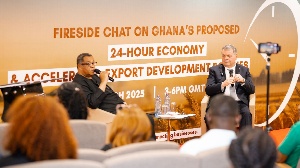- Home - News
- Elections 2024
- News Archive
- Crime & Punishment
- Politics
- Regional
- Editorial
- Health
- Ghanaians Abroad
- Tabloid
- Africa
- Religion
- Photo Archives
- Press Release
General News of Sunday, 27 April 2025
Source: www.ghanawebbers.com
Be ready to access markets by meeting required standards – Goosie Tanoh to exporters
Ghana's Export Readiness and the 24-Hour Economy
Mr. Augustus ‘Goosie’ Tanoh, Presidential Advisor on the 24-Hour Economy, spoke to Ghanaian exporters. He urged them to meet international standards for market readiness. This message was delivered at the UK-Ghana Chamber of Commerce Forum at CalBank PLC’s Head Office.
Mr. Tanoh noted that global trade is becoming more uncertain. He mentioned that trade agreements like AGOA may not last beyond 2026. The growing ties between the EU, UK, and MERCOSUR could also impact Ghana’s exports.
He emphasized that exporters should seize opportunities amid these uncertainties. They must also avoid potential pitfalls through the 24-Hour Economy programme. “To be competitive, we must be price competitive,” he stated.
The technology adaptation programme aims to enhance quality in production. Exporters should focus on products where they have a natural advantage. “We need to pursue and perfect those areas,” he added.
The forum was organized in response to concerns from the UKGCC's 2024 Business Environment & Competitiveness Survey Report. Eugene Sangmortey from the Ghana JET Programme discussed support for economic growth in key sectors.
The JET Programme aims to create quality jobs in five strategic manufacturing sectors: textiles, agro-processing, pharmaceuticals, automotive, and light manufacturing. It seeks £120 million in investments to drive innovation and create at least seven thousand jobs.
Understanding the 24-Hour Economy Policy
The 24-Hour Economy Policy aims to reduce Ghana’s import dependence significantly. It focuses on integrating value chains and improving production quality and volume. The policy also seeks to optimize digital resources for better productivity.
Abdul-Nasser Alidu from the Secretariat highlighted maximizing resource use throughout the day. The initiative will implement seven sub-programmes with private sector partnerships.
One sub-programme focuses on easing access to finance for businesses. High costs and collateral requirements currently hinder business growth in Ghana.
Mr. Alidu explained plans to build a financing program with reduced costs by removing barriers. Mr. Tanoh stressed transparency as essential for trust within the private sector.
He believes a strong private sector can generate wealth and create jobs effectively. The government is raising funds to support this initiative while ensuring it remains private sector-led.
UK as a Strategic Trade Partner
Mr. Alidu mentioned engaging development finance institutions from the UK for long-term financing options. Mr. Tanoh encouraged viewing Ghana as a viable market for UK growth opportunities.
He pointed out that there are many untapped possibilities requiring foreign direct investment (FDI). This includes agriculture and manufacturing initiatives that benefit both nations historically linked by trade.
Steven Gray from UK Export Finance acknowledged shared values between Ghana and the UK government during his speech at the forum. He revealed ongoing consultations about changing their relationship from donor-recipient to equal partners.
Mr. Gray called this an exciting opportunity for stakeholders to provide feedback through the British High Commission in Accra.
The forum also discussed operational principles of the 24-Hour Economy Secretariat, proposed reforms, and roles of foreign investors alongside local institutions like Ghana Standards Authority and Ghana Export Promotion Authority.











